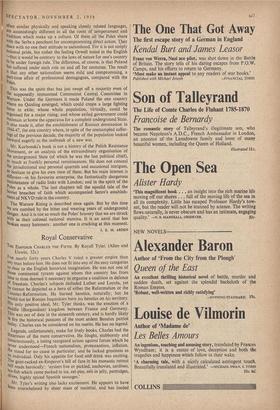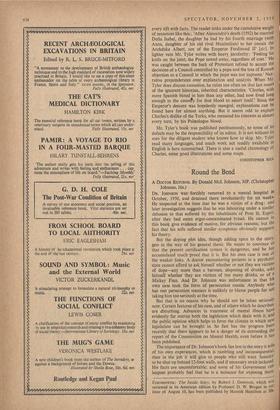Royal Conservative
b
FOR nearly forty years Charles V ruled a greater empire than a lY man before him. He does not fit into any of the easy categories So dear to the English historical imagination. He was not one of those continental tyrants against whom this country has from time to time deemed it necessary to organise a coalition in defence of freedom. Charles's subjects included Luther and Loyola, yet he cannot be depicted as a hero of either the Reformation or the Counter-Reformation. He burned heretics, naturally; but he would not let Roman Inquisitors burn his heretics on his territory. tits only positive ideal, Mr. Tyler thinks, was the erection of a middle (Burgundian) kingdom between France and Germany. This was out of date in the sixteenth century, and is hardly likely to fire the historical passions of the most ardent Benelux patriot today. Charles can be considered on his merits. He has no legend. Legends, unfortunately, make for lively books. Charles had the dreariness of the mere conservative. He fought, stubbornly and eonscientiously, a losing rearguard action against forces which he Weyer understood—French nationalism, protestantism, inflation. He stood for no cause in particular; and he lacked greatness as Individual. ndividual. Only his appetite for food and drink was exciting. Stn gout-racked ex-Emperor's bill of fare in his monastic retreat ill reads heroically : 'oysters live or pickled, anchovies, sardines, Sea -fish which came packed in ice, eel-pies, eels in jelly, partridges,
olives, v highly spiced Spanish sausages.'
Mr. Tyler's writing also lacks excitement. He appears to have overwhelmed by sheer mass of material, and has loaded
every rift with facts. The reader sinks under the cumulative weigh of sentences like this: 'After Alessandro's death (1592) he marriel Dona Isabel, the daughter he had by his fourth marriage (witl Anna, daughter of his old rival Maximilian) to her cousin th Archduke Albert, son of the Emperor Ferdinand II' [sic]. II1 lighter vein Mr. Tyler writes with heavy. jocularity : 'Feeling his knife on the joint, the Pope sawed away, regardless of cost.' H was caught between the bark of Protestant refusal to accept th decisions of a Council controlled by a pope and the tree of Roma' objection to a Council in which the pope was not supreme.' Nar rative preponderates over explanation and analysis. When Mt Tyler does discuss causation, he relies too often on that last resor of the ignorant historian, inherited characteristics. 'Charles, witl more Spanish blood in him than any other, had now lived loft enough in the count?y for that blood to assert itself.' Since th Emperor's descent was hopelessly mongrel, explanations can 11 found here for almost anything. But it seems odd to explaii Charles's dislike of the Turks, who menaced his interests at almos every turn, by his Palzologus blood.
Mr. Tyler's book was published posthumously, so some of it defects may be the responsibility of its editor. It is not without it uses for the diligent student who knows how to skip. Mr. Tyle read many languages, and much work not readily available it English is here summarised. There is also a useful chronology 0 Charles, some good illustrations and some maps.
CHRISTOPHER HILL



































 Previous page
Previous page